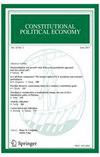Clubbing in trade policies: How much a threat to the multilateral constitution?
IF 0.7
Q2 LAW
引用次数: 0
Abstract
Abstract Preferential trade agreements (PTAs) have mushroomed over the last decades. However, the various forms of bi- and plurilateral arrangements have always been met with the concern that their proliferation might come at the expense of overall trade freedom because of undermining multilateral governance. This paper starts from the fact that international treaties are notoriously difficult to enforce, as is compliance with (trade) agreements. By focusing on the political economy of how cooperation in trade liberalization is ultimately sustained via the threat of retaliation as institutionalized within the World Trade Organization (WTO), the paper illuminates a novel and completely different channel between PTA membership and multilateral trade liberalization. Exploring their interaction with respect to trade freedom, we explain that PTA membership actually improves on the working of multilateral arrangements that are supposed to ensure cooperation in trade liberalization, thus effectively catering to more open trade.

贸易政策的棒子化:对多边宪法的威胁有多大?
优惠贸易协定(pta)在过去几十年中如雨后春笋般涌现。然而,各种形式的双边和诸边安排一直受到关注,即它们的扩散可能会损害整体贸易自由,因为它们破坏了多边治理。本文的出发点是国际条约的执行是出了名的困难,遵守(贸易)协定也是如此。通过关注贸易自由化合作如何最终通过世界贸易组织(WTO)内制度化的报复威胁得以维持的政治经济学,本文阐明了PTA成员与多边贸易自由化之间的一种全新的、完全不同的渠道。在探讨它们在贸易自由方面的相互作用时,我们解释说,PTA成员资格实际上改善了多边安排的工作,这些安排本应确保贸易自由化方面的合作,从而有效地满足更开放的贸易。
本文章由计算机程序翻译,如有差异,请以英文原文为准。
求助全文
约1分钟内获得全文
求助全文
来源期刊
CiteScore
1.80
自引率
0.00%
发文量
18
期刊介绍:
Constitutional Political Economy is a forum for research in the broad area of constitutional analysis, which lies at the intersection of several approaches in modern economics, sharing a common interest in the systematic integration of the institutional dimension - the study of political, legal and moral institutions - into economic analysis.
While its primary discipline is economics, Constitutional Political Economy is explicitly interdisciplinary, aiming to encourage an exchange between the various social sciences, including law, philosophy, political science and sociology. Theoretical and empirical research, as well as contributions to constitutional policy issues, are considered for publication.
Officially cited as: Const Polit Econ

 求助内容:
求助内容: 应助结果提醒方式:
应助结果提醒方式:


